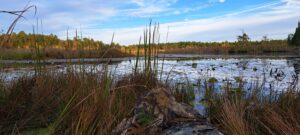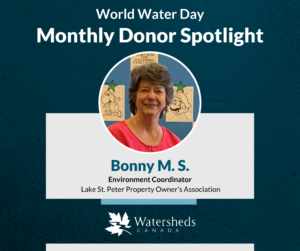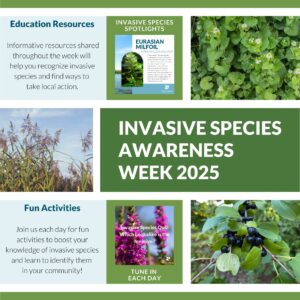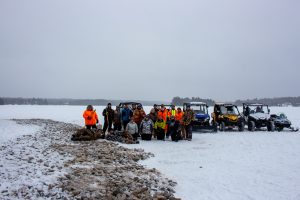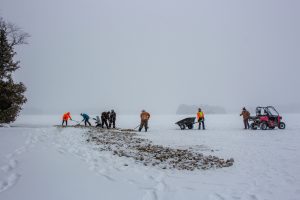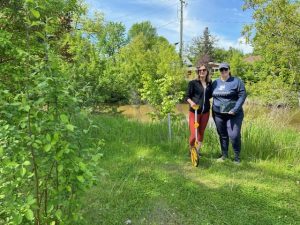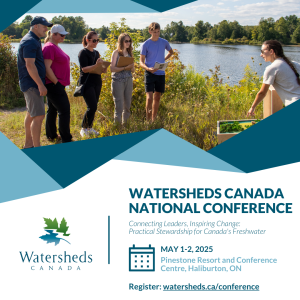Havelock, Ontario, February 24, 2026 -- The five pillars of partnership perfection joined together for a $16,000 Yamaha Financial Services [YFS] Stay Outdoors Program cheque presentation to Watersheds Canada during a media event hosted by Dunfords Powersports & Marine. On Tuesday, February 24, the Dunfords showroom floor glittered with much more than leading outdoor brands and products - it was a showcase of the partnership commitment of Yamaha Financial Services, Yamaha Motor Company, ... Read More
This World Wetlands Day, protect what protects us!
Wetlands are often overlooked and undervalued. However, acre for acre, few places on Earth give back to our water, climate, and wildlife more than wetlands. This World Wetlands Day, I urge you to look below the surface to see the incredible power held by these spaces, and donate to support Watersheds Canada's work in restoring them. I want to support Canada’s wetlands with a donation! With wetlands, we’re only seeing half the picture. Under the surface are ... Read More
Septic Systems – Public Perception and Awareness Survey
Return back to the Septic System Education Toolkit by clicking here! ... Read More
Spotlighting a Freshwater Hero this World Water Day
March 22nd is World Water Day! For this special occasion, we want to highlight an equally special someone who has made a powerful commitment to conserving freshwater here in Canada: one of our esteemed monthly donors, Bonny. “My volunteer work with our lake association started with one issue, and then it grew from there!” she said, reflecting on the beginning of her journey as Environment Coordinator for the Lake St. Peter Property Owner’s Association in Ontario. Melissa Dakers of ... Read More
Invasive Species Awareness Week 2025 recap
Did you know Invasive Species Awareness Week (ISAW) takes place each year during the last week of February? The goal of the week is for individuals and groups to come together to increase awareness about the impacts of invasive species and how we can protect natural spaces from them and their impacts. Each year, Watersheds Canada participates in ISAW by posting a week-long education campaign across its different social media platforms. You can find Watersheds Canada on Facebook, Instagram, ... Read More
Press release – Fish Habitat team wrap up walleye spawning bed restoration on Big Clear Lake, Ontario
On February 6, 2025, members of Watersheds Canada’s Fish Habitat team met with 16 volunteers from local groups to undertake the final stage of the restoration of a walleye spawning bed on Big Clear Lake, Ontario. In partnership with Big Clear Lake Association, Shabot Obaadjiwan First Nation, and G.E. Matson and Sons Construction, 17 tonnes of washed river rock were moved overtop the historic walleye spawning bed. Come spring, the ice will melt and the rock will fall through and settle at the ... Read More
On the Ice Road to Restoration: Reflecting on our recent Walleye Habitat Enhancement Project
by Ty Fischer, Freshwater Health Coordinator, Watersheds Canada Though it covers Canadian lakes like a big frozen shield, the thick winter ice is not a hindrance to the delivery of Watersheds Canada’s Fish Habitat restoration projects – it is an asset. This is especially true for spawning bed enhancement projects, like the one that took place on February 6, 2025. On this day, the Watersheds Canada team met with 16 volunteers from Big Clear Lake Association, Shabot Obaadjiwan First Nation, ... Read More
New Watersheds Canada, Boyne River Keepers partnership brings The Natural Edge to Manitoba
February 20, 2025 - Watersheds Canada and the Boyne River Keepers will work to improve shoreline health and resiliency along the Boyne River, Manitoba by naturalizing shoreline properties in 2024-2025. The project, funded by Manitoba Habitat Conservancy and RBC Foundation, will result in 1,500m2 of riparian habitat restored and the planting of 750 native trees, shrubs, and wildflowers. As a result, the Boyne River will see increased biodiversity, improved water quality, increased flood ... Read More
Federal funds support Watersheds Canada efforts to restore shorelines in St. Lawrence River AOC
January 24, 2025 - An exciting opportunity is available for waterfront property owners in the St. Lawrence River (Cornwall/Akwesasne) Area of Concern (AOC) who want to naturalize their shoreline using native trees, shrubs, grasses, and wildflowers. A healthy shoreline buffer can help protect a property from erosion and flood damage, while also creating habitat for wildlife, and improving overall water quality. Watersheds Canada, a national charity headquartered in Perth, ON, is delivering its ... Read More
Watersheds Canada announces National Conference, May 1-2, 2025
Watersheds Canada is thrilled to announce the inaugural Watersheds Canada National Conference, taking place May 1-2, 2025 in Haliburton, Ontario. Immerse yourself in speaker presentations, group activities, plenary sessions, networking time, and outdoor interactive demonstrations, all to lead inspiration into action! This event will bring together fellow lake and watershed enthusiasts for an engaging experience that takes you beyond the conference room and into the field with hands-on ... Read More
- 1
- 2
- 3
- …
- 15
- Next Page »


